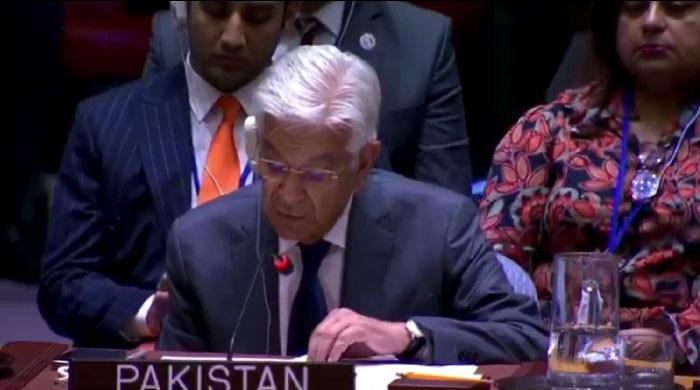
- Defence minister attends UN session on artificial intelligence.
- Khawaja Asif warns of AI-driven risks to global security.
- Decisions on nuclear weapon use must rest with humans: UN chief.
Defence Minister Khawaja Asif has warned that future wars could become far more dangerous as the use of artificial intelligence in military systems accelerates, raising serious risks for global peace and stability.
The defence czar made these remarks while addressing a high-level debate on artificial intelligence (AI) on Wednesday.
“AI has simplified decision-making processes, but it has also created conditions where future wars may be significantly more dangerous,” Asif warned, urging all states to ensure that technological advances are harnessed under the UN Charter for the benefit of humanity.
The defence minister further said that Pakistan had introduced its first national AI policy earlier this year, reflecting the government’s commitment to responsible innovation while ensuring safeguards against misuse.
“[The] world must adopt collective measures to prevent an uncontrolled arms race in this domain,” he added.
“We must ensure that AI is harnessed to promote peace and development, not conflict and instability,” Khawaja Asif added.
The minister concluded his speech by reiterating that Pakistan remains committed to supporting international efforts aimed at balancing technological progress with the imperatives of global peace and stability.
Earlier, opening the debate, UN Secretary-General Antonio Guterres said that AI is “no longer a distant horizon — it is here, transforming daily life, the information space and the global economy at breathtaking speed”.
“When used responsibly, AI can strengthen prevention and protection in a myriad of ways, including anticipating food insecurity, supporting de-mining, and helping identify potential outbreaks of violence,” he said.
Citing AI-enabled cyberattacks that can disrupt critical infrastructure in minutes and threats to information integrity, he emphasised: “Innovation must serve humanity – not undermine it.”
The UN chief recalled that last month, UNGA established an Independent International Scientific Panel on AI and an annual Global Dialogue on AI Governance.
Addressing priorities, he stated that humanity’s fate cannot be left to an algorithm as humans must always retain authority over life-and-death decisions.
Urging the council and member states to ensure that human control and judgment are preserved in every use of force, he again called for a ban on lethal autonomous weapons systems operating without human control, with a legally binding instrument by 2026.
“Similarly, any decision in nuclear weapon use must rest with humans — not machines”, he stressed.
— With additional input from APP
Discover more from Brackly News
Subscribe to get the latest posts sent to your email.



